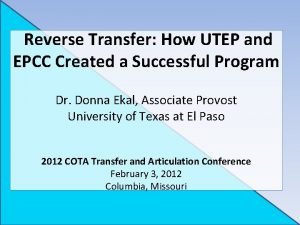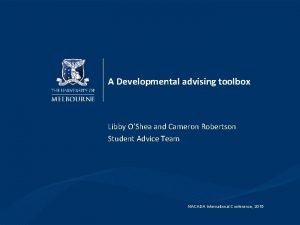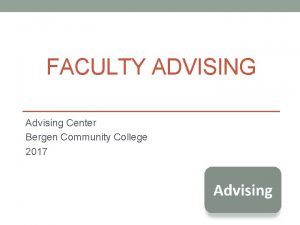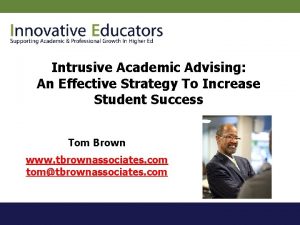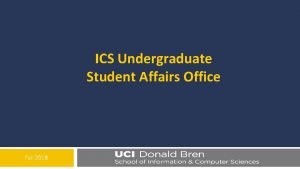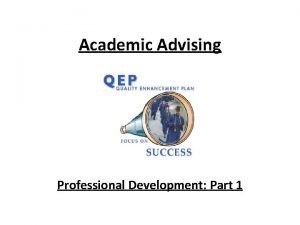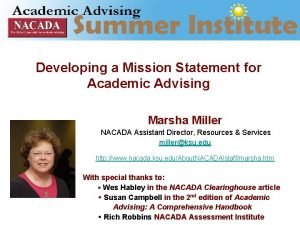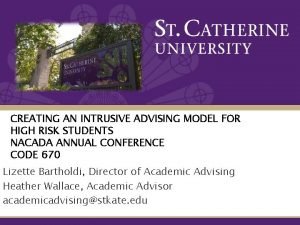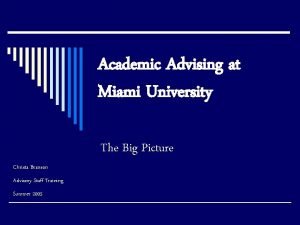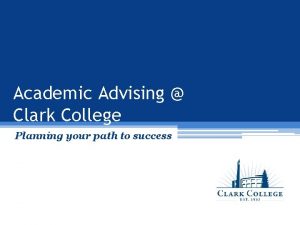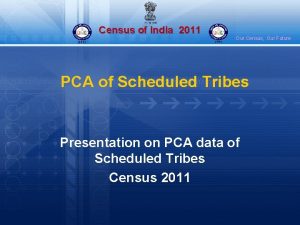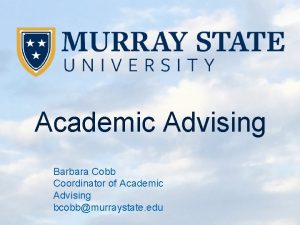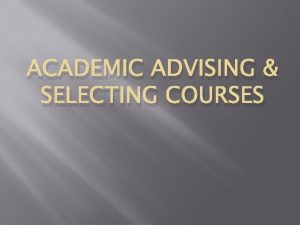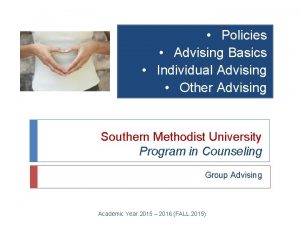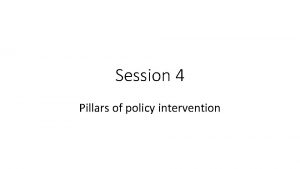Pillars of Academic Advising Impact on our Advising





























- Slides: 29

Pillars of Academic Advising: Impact on our Advising Practices 2017 NACADA Annual Conference NACADA Executive Office | Kansas State University | 2323 Anderson Ave, Suite 225 | Manhattan, KS 66502 -2912 Phone: (785) 532 -5717 | Fax: (785) 532 -7732 | e-mail: nacada@ksu. edu © 2017 NACADA: The Global Community for Academic Advising The contents of all material in this presentation are copyrighted by NACADA: The Global Community for Academic Advising, unless otherwise indicated. Copyright is not claimed as to any part of an original work prepared by a U. S. or state government officer or employee as part of that person's official duties. All rights are reserved by NACADA, and content may not be reproduced, downloaded, disseminated, published, or transferred in any form or by any means, except with the prior written permission of NACADA, or as indicated below. Members of NACADA may download pages or other content for their own use, consistent with the mission and purpose of NACADA. However, no part of such content may be otherwise or subsequently be reproduced, downloaded, disseminated, published, or transferred, in any form or by any means, except with the prior written permission of, and with express attribution to NACADA. Copyright infringement is a violation of federal law and is subject to criminal and civil penalties. NACADA and NACADA: The Global Community for Academic Advising are service marks of the NACADA: The Global Community for Academic Advising

Overview of Session • Review of the 3 Pillar Documents • Examine how the 3 Pillars are used on our own campuses • Preview the Academic Advising Core Competencies Model

The Three Pillar Documents • Concept of Academic Advising (NACADA) • Core Values of Academic Advising (NACADA) • Council for the Advancement of Standards (CAS) in Higher Education Standards for Academic Advising (CAS)

Purpose of the Pillars • Structure for programs and the profession: • Philosophy/Approach • Theory • Code of Ethics • Standards for Quality

Purpose of the Pillars “…starting points and references for a discussion of academic advising, providing the framework for a coherent approach to implementing a wellfunctioning academic advising program that would meet any specified institutional goals. ” NACADA: The Global Community for Academic Advising. (2006). NACADA concept of academic advising. Retrieved from NACADA Clearinghouse of Academic Advising Resources Web Site: http: //www. nacada. ksu. edu/Resources/Clearinghouse/View-Articles/Concept-of-Academic-Advising-a 598. aspx

Concept of Academic Advising • Approved 2006 • Tells us: What is advising?

The NACADA Concept Statement • Multi-dimensional and intentional • Grounded in teaching and learning • Includes specific purpose and content • Includes specific student learning outcomes for academic advising

NACADA Concept Statement • Affirms that academic advising is a form of teaching with • A curriculum • A pedagogy • A set of student learning outcomes (including sample student learning outcomes) • Affirms that academic advising is an integral part of higher education

Let’s Practice How do you currently apply the Concept Statement in your daily advising practice? What’s one thing you can do to improve your advising practice based on the Concept Statement?

NACADA Core Values • Six values NACADA adopted in 2004 as being important regarding what academic advisors are expected to do as part of the advising interaction • Revised in 2016 -17 to better reflect the values important in our advising practice

Core beha values know vior and - the gui ding a w c t h i prin dete on. C a t i s their rmine if right fro ore valu ciples th a t unch goals; a hey are m wrong es can h t dictate n e o angi ng g d they c n the rig ; they ca lp peop uide le to n he reate h t p. lp en ath a an u t n i nwa verin d fulfillin ties g an d g

Caring Academic advisors respond to and are accessible to others in ways that challenge, support, nurture, and teach. Advisors build relationships through empathetic listening and compassion for students, colleagues, and others. Commitment Academic advisors value and are dedicated to excellence in all dimensions of student success. Advisors are committed to students, colleagues, institutions, and the profession through assessment, scholarly inquiry, life-long learning, and professional development.

Empowerment Academic advisors motivate, encourage, and support students and the greater educational community to recognize their potential, meet challenges, and respect individuality. Inclusivity Academic advisors respect, engage, and value a supportive culture for diverse populations. Advisors strive to create and support environments that consider the needs and perspectives of students, institutions, and colleagues through openness, acceptance, and equity.

Integrity Academic advisors act intentionally in accordance with ethical and professional behavior developed through reflective practice. Advisors value honesty, transparency, and accountability to the student, institution, and the advising profession. Professionalism Academic advisors act in accordance with the values of the profession of advising for the greater good of students, colleagues, institutions, and higher education in general. Respect Academic advisors honor the inherent value of all students. Advisors build positive relationships by understanding and appreciating students’ views and cultures, maintaining a student-centered approach and mindset, and treating students with sensitivity and fairness.

Let’s Practice How do you currently apply the Core Values in your daily advising practice? What’s one thing you can do to improve your advising practice based on the Core Values?

CAS Standards for Academic Advising Council for the Advancement of Standards in Higher Education (CAS) Standards and Guidelines for Academic Advising http: //standards. cas. edu/getpdf. cfm? PDF=E 864 D 2 C 4 D 655 -8 F 74 -2 E 647 CDECD 29 B 7 D 0

CAS Standards for Academic Advising • Domains and dimensions developed based on every type of higher education institutional type • Each outcome will be achieved based on exposure to student and student maturity • Requires a systematic approach re: introducing these concepts and expectations in order for students to achieve these student learning outcomes

CAS Standards for Academic Advising Academic advising promotes learning and development in students by encouraging experiences which lead to: • • intellectual growth the ability to communicate effectively appropriate career choices leadership development the ability to work independently collaboratively the ability to work collaboratively and so on for all CAS domains and dimensions

CAS Standards for Academic Advising To achieve their mission, Academic Advising Programs (AAP) must contribute to • Student learning and development • Identification of relevant and desirable student learning and development outcomes • Articulations of how the outcomes align with the six CAS student learning and development domains and related dimensions

Let’s Practice How do you currently apply the CAS Standards in your daily advising practice? What’s one thing you can do to improve your advising practice based on the CAS Standards?


cy · n e t ·pe· n a s e guish n i t s i s d cie e that n e m t r o e o g c p a b t e om advan jo r c cor a l e r u o r s. partic c n r o : u o y n t o i t n ou pabili et a n p n l i m a plur ining ca m its co petence f a de rprise fro l of com ente ined leve gram. f a de emic pro acad

CONCEPTUAL~understanding of • the history and purpose of higher education • the Core Values of Academic Advising • theory relevant to advising • the practice of advising (approaches and methods) • the expected outcomes for advising • how equitable and inclusive environments are created and maintained

INFORMATIONAL~Knowledge of • institution specific history, vision, mission, values, and culture • curriculum, degree programs, and other academic requirements and options • institution specific policies, procedures, rules, and regulations • legal guidelines of advising practice • the characteristics, needs, and experiences of student populations • resources that support student success • information technology relevant to academic advising

RELATIONAL~Ability to • Articulate a personal philosophy of advising • Create rapport and develop advising relationships • Communicate in an inclusive and culturally competent manner • Facilitate student appointments • Promote an understanding of the logic and purpose of the curriculum • Facilitate problem-solving, decision-making, meaning-making, planning, and goal setting

Let’s Practice

How can you apply the Core Competencies Model to your advising practice?

This Photo by Unknown Author is licensed under CC BY-SA

Presenters acknowledge and appreciate contributions from colleague Jayne Drake and the faculty of NACADA’s Assessment and Administrators’ Institutes!
 Pillars of academic advising
Pillars of academic advising Insidecbu
Insidecbu Consortium agreement utep
Consortium agreement utep Robert kwong
Robert kwong Academic advising unimelb
Academic advising unimelb Fau advising appointments
Fau advising appointments Bergen community college advising
Bergen community college advising Intrusive advising
Intrusive advising Ics student affairs
Ics student affairs Pcc advising
Pcc advising Dilbert mission statement generator
Dilbert mission statement generator Intrusive advising model
Intrusive advising model Wku majors
Wku majors Uwb biology degree checklist
Uwb biology degree checklist Pcc academic advising
Pcc academic advising Uwb degree audit
Uwb degree audit Miami university advising
Miami university advising Clark college advising zoom
Clark college advising zoom Lane community college advising
Lane community college advising Applying student development theory
Applying student development theory 5 pillars of academic integrity
5 pillars of academic integrity Our census our future
Our census our future Awareness of ourselves and our environment is
Awareness of ourselves and our environment is Christ be our light bernadette farrell
Christ be our light bernadette farrell Our life is what our thoughts make it
Our life is what our thoughts make it Awareness of ourselves and our environment is:
Awareness of ourselves and our environment is: Our awareness of ourselves and our environment is called
Our awareness of ourselves and our environment is called Our life is what our thoughts make it
Our life is what our thoughts make it Who is poet of money madness
Who is poet of money madness God our father christ our brother
God our father christ our brother


